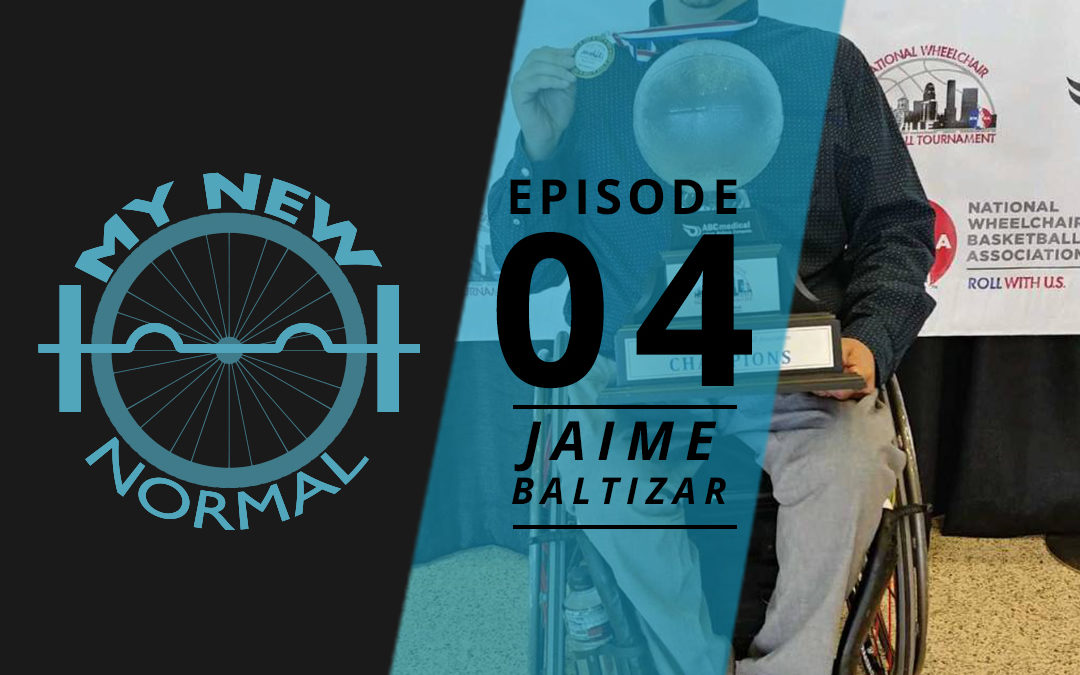Imagine this: you grew up in in bad gang ridden neighborhood in Chicago, your only escape was basketball, but before puberty was even over you lost the use of your legs. How would you deal with that? Many people would give up on life or give in to being a part of a gang to feel accepted.
Meet Jaime Baltazar. The previously mentioned hypothetical is his new normal and un like many others he did not give in or give up even when his surroundings would have made it easy. Instead he became a wheelchair basketball badass for University of Illinois and parlayed that skill into a career as a basketball coach. Tune into this weeks episode of the My New Normal Podcast to hear Jaime’s story and find out the secrets to his unwavering mindset.
Topics Covered on This Weeks Podcast Are:
- Jaime’s Story
- Dealing with judgement from living life in a chair
- Adapting to a chair sport after playing in out of the chair
- Dealing with gang violence
- The mindset of resilience
- The impacts of high intensity functional fitness on sport
To learn more about wheeled athletes & most common injuries that put someone in a wheelchair such as spinal cord injuries check out: https://www.drtheresalarson.com/wheeled-athlete-spinal-cord-injuries/
To check out my Functional Training for the Adaptive Athlete Online Course (eligible for 0.5 CEU’s for NSCA under Category D), visit: https://www.drtheresalarson.com/adaptive-trainers-course/
The Summary:
Today’s guest on My New Normal Podcast is Jamie Baltazar is the head coach of the San Diego Wolf Pack, which is an all military, wheelchair basketball team located in San Diego, CA.
I assisted on the team for a season and then had the great opportunity to continuously work with the athletes in my adaptive CrossFit programs.
Jaime (pronounced Hi-May) experienced a thoracic level 12, and lumbar level 1 spinal cord injury. He was shot just near the ribcage and has an incomplete spinal cord injury, but he hasn’t let that stop him and is absolutely crushing life.
Jaime grew up in Southside Chicago, in the Back of the Arts neighborhood, which was primarily Latino. He was raised by his grandmother, who kept him active in sports and the church to stay out of the gangs that really ran his neighborhood.
When he was 17 he was the victim of gun violence, in a “wrong place wrong time” situation where a gang retaliated, and he just happened to be in a place where the opposing gang hung out. He was shot while in his car, in his ribs and the bullet is still lodged in his spinal cord. The last memory Jaime has of using his legs is putting his car into park.
Fortunately for Jaime he was able to rehab at the Rehab Institute of Chicago, which ranks as the top rehab facility in the nation. Through that facility he continued to be involved in sports and was able to get a scholarship to the University of Illinois to play wheelchair basketball.
At Illinois, he not only won TWO championships with the team, he majored in Sports Management and minored in Sociology, and started to pursue his passion to work with at-risk youth.
God had different plans for him though, and he got involved with the Warrior Games and coaching wounded and ill soldiers in an Olympic style tournament. Through the Warrior Games, athletes then get picked to compete at the Invictus Games.
Jaime is an incredible individual and this episode is PACKED with information not only for adaptive athletes, but anyone that is needing to feel inspired.
In this episode we’re talking about:
- Jaime’s injury and how he adapted
- Wheelchair basketball and how to get involved
- How we can be more accepting to the adaptive community
- The challenges that Jaime faces daily
- Movements that can help wheelchair athletes adapt

